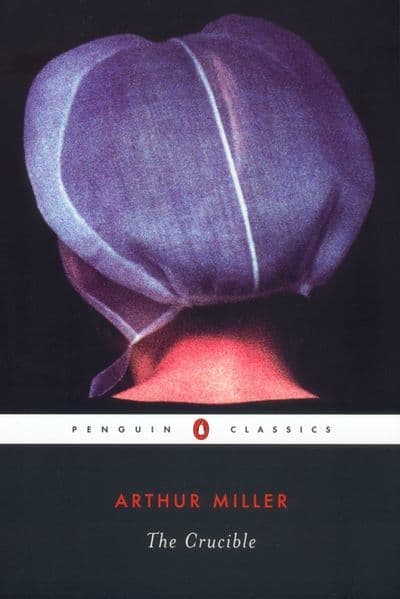
Book Review Summary: The Crucible: A Play in Four Acts
Introduction
The Crucible, written by Arthur Miller, is a powerful play that explores the dark chapter of human history during the Salem witch trials in seventeenth-century Massachusetts. Miller's drama is a searing portrait of a community engulfed by hysteria, where rumors of witchcraft galvanize the town's fears and suspicions. Set against the backdrop of the McCarthy era, Miller uses the play as a mirror to reflect the anti-communist hysteria inspired by Senator Joseph McCarthy's "witch-hunts." With its compelling characters, historical context, and themes of socially sanctioned violence, The Crucible continues to captivate readers and leave a lasting impact.
About Arthur Miller
Arthur Miller was an American playwright and essayist who made significant contributions to American literature and cinema. He was born in 1915 and passed away in 2005. Miller's plays, such as The Crucible, A View from the Bridge, All My Sons, and Death of a Salesman, remain widely studied and performed worldwide. Throughout his career, Miller was known for his ability to delve into the human condition and explore complex themes such as morality, guilt, and redemption. He was also known for his public stance against the House Un-American Activities Committee and his refusal to give evidence against others during the McCarthy era.
Analysis of Views
-
Hysteria and the Destructive Power of Socially Sanctioned Violence: Many readers praise Miller's ability to capture the essence of the Salem witch trials and the destructive power of socially sanctioned violence. They find the portrayal of hysteria and the way it engulfs a community to be chillingly accurate. Miller's exploration of how rumors and fear can lead to false accusations and innocent lives being destroyed resonates with readers today.
-
Miller's Reflection on Anti-Communist Hysteria: The Crucible is also recognized as a reflection on anti-communist hysteria during the McCarthy era. Readers appreciate Miller's ability to draw parallels between the Salem witch trials and the Red Scare of the 1950s. They find Miller's commentary on how political opposition can be equated with moral right and opposition to it with diabolical malevolence to be thought-provoking.
-
Exploration of Guilt and Redemption: The play delves into the complex themes of guilt and redemption, particularly through the character of John Proctor. Readers find Miller's portrayal of Proctor's struggle to redeem himself from his past actions to be moving and relatable. They appreciate how Miller explores the consequences of guilt and how individuals can strive for redemption even in the face of adversity.
-
Powerful Characters and Dramatic Dialogue: The Crucible is known for its well-developed characters and engaging dialogue. Readers praise Miller's ability to create memorable characters that evoke strong emotions. They find the interactions between characters, such as John Proctor and Elizabeth Proctor, to be compelling and thought-provoking.
-
Historical Context and Relevance: The play's historical context adds depth and relevance to the story. Readers appreciate Miller's incorporation of real events and historical figures into the narrative. They find the exploration of how societal fears and suspicions can lead to injustice to be timely and relevant even today.
Reasons for Recommendation
-
Thought-Provoking Themes: The Crucible offers readers a thought-provoking exploration of themes such as hysteria, socially sanctioned violence, guilt, redemption, and political oppression. These themes resonate with readers and provide a deeper understanding of human nature and society.
-
Engaging Characters: The well-developed characters in The Crucible make the story come alive. Readers appreciate Miller's ability to create complex individuals with relatable motivations and struggles. The interactions between characters add depth to the narrative and keep readers invested in the story.
-
Historical Significance: The play's historical context adds depth and relevance to the story. By incorporating real events and historical figures, Miller provides readers with a deeper understanding of a dark chapter in American history. This historical significance makes The Crucible a valuable addition to any reading list.
Reasons for Not Recommendation
-
Portrayal of Women: Some readers criticize Miller's portrayal of women in The Crucible as one-dimensional witches or victims without agency. They feel that Miller fails to question patriarchal standards prevalent during the Salem witch trials and instead focuses on male characters with more complexity and autonomy. This portrayal may be off-putting for readers seeking a more balanced representation of women in literature.
-
Lack of Emotional Connection: A few readers find that they struggle to connect emotionally with certain characters or events in The Crucible. They feel that certain scenes lack emotional depth or impact, which detracts from their overall experience with the play. However, it is important to note that individual responses to literature can vary greatly based on personal preferences and experiences.
Conclusion
The Crucible by Arthur Miller is a powerful play that continues to captivate readers with its exploration of hysteria, socially sanctioned violence, guilt, redemption, and historical relevance. Through its well-developed characters, engaging dialogue, and thought-provoking themes, The Crucible offers a compelling portrayal of human nature and society under extreme circumstances. While some readers may have reservations about certain aspects of the portrayal of women or lack of emotional connection, overall, The Crucible remains a highly recommended read for those interested in literature that challenges, inspires, and provokes reflection on humanity's darker aspects.